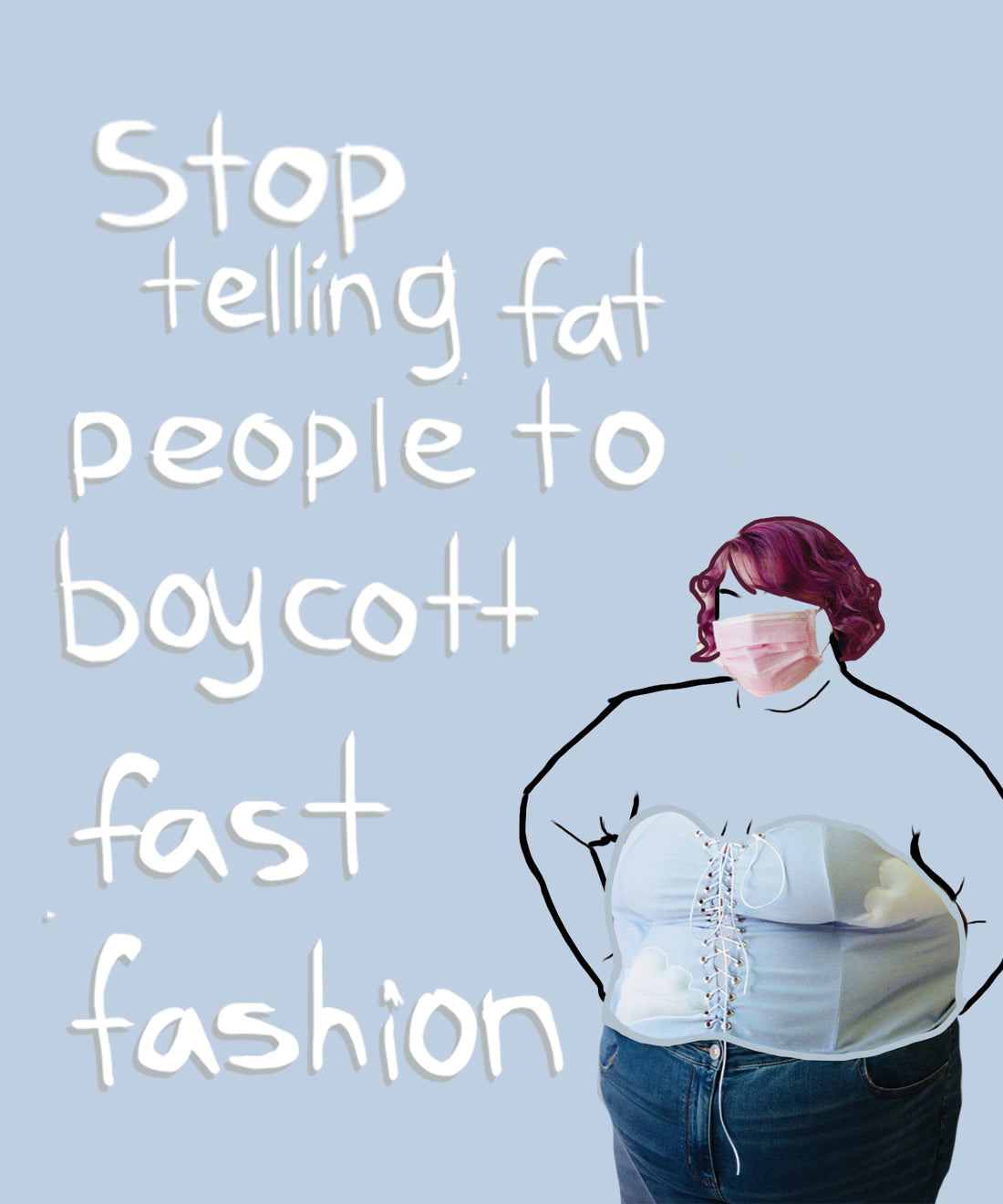By Sabrina, designer and creator of WASIL
At this point most of us are somewhat aware of the deeply abusive production practices in “sweat shops” or places where fast fashion garments are manufactured. We have conditioned low income people to rely on these chains since the late 90’s, but a huge surge in fast fashion came during the better days of Forever 21, H&M, Zara, etc.
As home sewing became more and more obsolete, huge fast fashion corporations seized the opportunity to offer low income people trendy fashions at an unbelievably low price. Essentially, consumers traded in quality made home sewn garments (that would last years not months) for the access to affordable clothing (While also satisfying the never ending pressure from the elitism in the fashion industry to be “on trend”).
While fast fashion was growing in popularity (and necessity), a huge demographic of consumers was left out: fat people.
Fast forward to 2018-2019ish. We see major retailers like Fashion Nova or Pretty Little Thing gaining buying power for serving small-mid fat ppl on trend clothing. On trend clothing that, for the first time, visibly aligned with what straight sized ppl had access to since the beginning of fast fashion. This simultaneously coincides with the mainstream-ification/popularization of the rise of anti fast fashion-ism.
Enter Reformation, or really any responsibly made retailer hitting the scene, repping skinny white women in all their brand’s imagery. And with that demographic also came some high price points- ones that would make any regular straight sized fast fashion consumer go “I could get that for a 1/4 of the price at [insert fast fashion brand here]”. And that they could! But if they’d really cared about the environment and well being of exploited garment workers, they would opt in to buy from Reformation (Who we now know is a very anti-black company). /s
Or maybe they couldn’t afford Reformation, so instead they went thrifting or browsed Depop- either way, they had/have viable options to boycott fast fashion, while not compromising access to trendy clothing (just had to sacrifice some days at the mall).
Circling back to our intentionally excluded consumer; anyone over a US size 18. Fat people, especially low income ones, are working with the options they have: fast fashion. Perhaps they score a few plus size pieces at the thrift store, you know, before it’s snatched up by a thin person’s next thrift flip. Either way, their options are incredibly limited as is.
Now sitting in 2021, the ideologies and privileges of thin people are clashing with fat people and their lack of access to fashion. Thin people are calling upon fat people to give up their fast fashion retailers in exchange for the more “ethical” approach to fashion, completely glossing over all of the difficulties of shopping while fat.
Fat people are criticized for asking thin people to stop cutting up the few 3XL shirts available at the thrift store, while simultaneously being told to get their clothes there.
Fat people are rejoicing over the cute swimsuit that they finally felt good in, but are quick to be told by a thin person “Remember shein is fast fashion and don’t support them this summer”. Yet, fat people are not given a single reliable alternative to shop plus sized swimwear at. “Try depop?”
Fat people who do have access to wealth arguably have more options than their low income counterpart. However, they are left to scour the Internet for small businesses that *might* accommodate them (Because the size range in the bio does not always apply to every single design for some reason...). While also paying the Reformation price (Rightfully so when clothing IS actually made responsibly).
When we ask fat people to boycott fast fashion, we need to take a serious look at who we are, what privileged we hold, and what solutions we can bring to the table. Harassing any consumer for shopping at fast fashion is frustrating to me, because it is centering the responsibility to dismantle a billion dollar industry on US and not THEM. The ones who strategically out priced “mom and pop shops” to force entire communities to funnel their money into a corporation instead of re-circling that wealth locally.
I think it’s important we do our part where we can, but we have to center and hold corporations responsible for what they’ve done. We have to provide ACTUAL solutions or alternatives to those who are unwillingly relying on Walmart. Most importantly, we have to mind our own business and only offer help/advice to those who ask for it.
If you want to help as a thin person, support small businesses that DO make clothing responsibly, that also offer up to sizes 5XL (or beyond). You can even leave a note at checkout saying “Thank you for making plus size clothing, I’ll be recommending your brand to my plus size friends”. Noting specifically you are shopping there to support access to plus size clothing will send a huge message to that brand to keep offering that sizing. Brand’s will even reduce sizing options if they don’t make sales often in those sizes- that extra reassurance that your morals is what inspired you to purchase from that brand will keep them in check. Share that brand on social media when you get your new garment, be transparent about your intentional shopping! Putting your money into a brand that serves fat people will actively create more demand, therefore options for fat people to enjoy! If you begin shopping only where superfat/infinifat people can, you’ll learn very quickly why this is such an important conversation to have.
So, TLDR; leave fat people alone while you pursue anti fast fashion activism. We (I repeat, especially larger fats) don’t have the options or privileges you do- poor or wealthy, this still applies!
